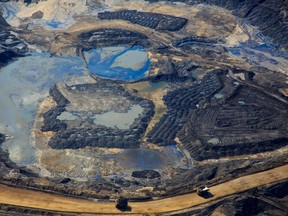It underscores the mercurial relationship between Ottawa and the industry, with the federal government and sector at times working together, but also prepared to press their case on divisive issues

Canadian oilsands producers are closely watching the federal government’s new rules that oversee advertising and climate claims, hoping to see changes soon.
As the controversy surrounding Bill C-59 continues to boil, companies such as Canadian Natural Resources and Cenovus Energy are touting the startup of the federally owned Trans Mountain pipeline, saying it’s already reducing the discount on Canadian heavy oil and the project will pay off for the country.
It underscores the mercurial relationship between Ottawa and the industry, with the federal government and sector at times working together, but also prepared to press their case on divisive issues, such as the oilsands emissions cap or Bill C-59.
“There’s still a lot of miscommunication between them, and misunderstanding,” said Kevin Birn, a vice-president with S&P Global Commodity Insights.
“And there’s a lot of complexity in these policies that need to be really thought out — about what’s the intended purpose and what’s the actual outcome . . . That continues to weigh on the entire overall investment picture in Canada.”
Last month, the federal government passed Bill C-59, a broad bill that includes a federal investment tax credit for carbon capture, utilization and storage (CCUS) projects, but also contains amendments to the federal Competition Act aimed at greenwashing.
Under those provisions, it says firms can’t represent the benefits of their business activity for protecting “or mitigating the environmental and ecological causes or effects of climate change that is not based on adequate and proper substantiation, in accordance with internationally recognized methodology.”
It’s still unclear to companies what the internationally recognized methodology will look like or how the process will unfold — but the burden of proof remains with the business to substantiate any claim.
“Simply put, we just want to understand what the standards are going to be,” Canadian Natural Resources president Scott Stauth said in an interview Thursday, after the company released its second-quarter results.
“The bill has been rewritten with certain aspects of it that make it very challenging, in terms of us to be able to conduct our business from a reporting out of the ESG standards.
“But there’s the opportunity to enhance the guidelines and get it to a point where the industry is able to understand the requirements.”
In an interview last month, federal Natural Resources Minister Jonathan Wilkinson called that decision an “unfortunate overreaction” by oil and gas producers. His provincial counterpart, Brian Jean, maintained the legislation panders to anti-oil and gas views within the federal Liberals and NDP.
In a statement, Pathways president Kendall Dilling said the group is gradually restoring information that has been reviewed and complies with the act.
In July, the Competition Bureau pledged to accelerate its consultation process on how the new provisions will be interpreted.
“I’m confident that they’re going to find the opportunity to get it right,” Stauth added.
On its second-quarter earnings call on Thursday, Cenovus Energy executives said they’re still pursuing their environmental work and emissions reduction efforts, calling the bill a distraction.
“The unintended consequence of Bill C-59 is that it stifled the discussion. And in Canada, we need to have robust discussion on energy policy because it’s such an important part of our economic fabric of this country,” said Cenovus CEO Jon McKenzie.
“We see a process in place to try and get some clarity around that, and my hope is that will happen sooner rather than later.”
The bill is a problem for the sector because there is vagueness around the standard while the potential fines could be large, leading to a risk mitigation approach being adopted by companies, said Heather Exner-Pirot, director of natural resources, energy and environment at the Macdonald-Laurier Institute.
“It was just a dereliction of duty by parliamentarians to let this amendment and bill go through since it was so obviously flawed,” she said.
“This is just so obviously politically motivated.”

The project has allowed the industry to export oil to new markets and customers in Asia, nearly tripling the capacity of the existing pipeline that moves western Canadian crude to the West Coast for shipping.
It also came in well over the $5.4-billion budget estimate set a decade earlier, and is now expected to cost about $34 billion to complete. Analysts say this could lead to a writedown by the government when it moves to sell Trans Mountain back to the private sector.
However, the project has reduced the price differential between benchmark U.S. crude prices and Western Canadian Select heavy oil. It’s also generating more royalties for the Alberta government.
Cenovus executive vice-president Geoff Murray said the price differential narrowed by about US$6 per barrel between the first and second quarters of this year, although it has widened during the past month due to market factors.
“Admittedly, it was over budget and admittedly it was probably more expensive than it needed to be. That being said, this will generate a huge amount of revenue for Canadians in the form of royalties and tax dollars that go toward the public purse,” added McKenzie.
“It’s an important piece of infrastructure for the country.”
Chris Varcoe is a Calgary Herald columnist.